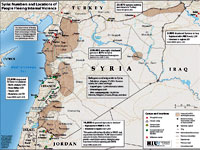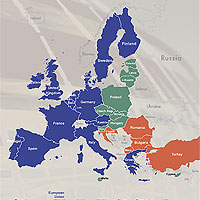Russian envoy sees EU ‘nuancing’ its position on Syria

(Interfax – Brussels, August 30 2013) Everything that the European Union has said so far in connection with the situation in Syria has been fairly tidily formulated and focused on the need for a political resolution of the Syrian crisis, believes Vladimir Chizhov, Russia’s permanent representative at the European Union.
He told Interfax in Brussels on Friday (30 August) that he sees a “certain nuancing” in the EU’s position on this issue in recent days.
 “First of all, it’s being recognized that they need to wait for the report from the UN inspectors. Second, more and more in political circles, and in parliaments, and in public opinion, people are starting to wonder about the legitimacy of using force,” the high-ranking diplomat said.
“First of all, it’s being recognized that they need to wait for the report from the UN inspectors. Second, more and more in political circles, and in parliaments, and in public opinion, people are starting to wonder about the legitimacy of using force,” the high-ranking diplomat said.
He referred to “fundamental truisms”. “Modern international law permits the use of force in only two situations: if there is a UN Security Council resolution authorizing it, or through the application of Article 51 of the UN Charter, in other words in order to exercise the right to individual or collective self-defence,” the Russian envoy explained.
According to him, “placing the current situation in Syria within either of these two formulae is pretty difficult”. “In the first instance, I cannot imagine how such a UN Security Council resolution could be adopted in the current situation. And as for the second, where’s the self-defence here?” Chizhov said.
“The rest, as they say, is devil’s work,” the diplomat continued. “The only thing that the people initiating this enterprise were able to dig up in international law was the 1925 Geneva convention on chemical weapons. But with all due respect to what is already a fairly old document, it contains no hints of the possibility of implementing a ban on the use of chemical weapons by means of force. And Syria, as we know, has not signed the convention prohibiting chemical weapons (signed in 1993),” the head of the Russian mission at the EU explained.
Reacting to the observation that London sees intervention on humanitarian grounds as a legal basis for military action against Syria, Chizhov noted: “This method of working, when legal arguments are shoehorned into conclusions that have already been drawn, gives the impression that the cart is placed in front of the horse.”
“And more generally, I would advise the leaders of Western countries, to paraphrase the famous maxim about who’s on the right side of history, to get on the right side of international law and resist the temptation to take this international law into their own hands,” the diplomat said.
He confirmed that the positions of various EU countries in respect of plans for armed intervention in Syria do not coincide, and cited the example of Austria, which “has already said that, if military action is taken, it will not allow aircraft to pass through its airspace”.
“And then we’ll see what happens. We need to see how the situation develops. It is clear that the people who initiated this will not be able to count on any joint EU or joint NATO operation. And they probably wouldn’t even try to pull that off. But I can’t rule out the possibility that there will be a coalition of the willing, which will not just include the US and European states, but into which they will certainly do all they can to drag other states in the region, certain members of the Arab League, for example,” Chizhov believes.
In any case, the envoy is convinced that “this will diverge from the principles of international law, and, in general, they are playing with fire”.
He proposed “reasoning hypothetically”. “Let’s say that there’s a sudden nuclear explosion in the Middle East. Everyone knows that the only state in the region that has nuclear weapons is Israel. According to the current logic being followed by the people initiating an operation against Syria, Israel would have to be bombed immediately. I struggle to imagine such a scenario being put into practice,” the high-ranking Russian diplomat said.
